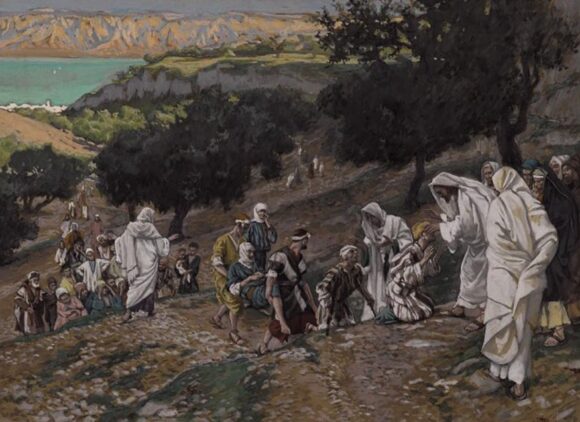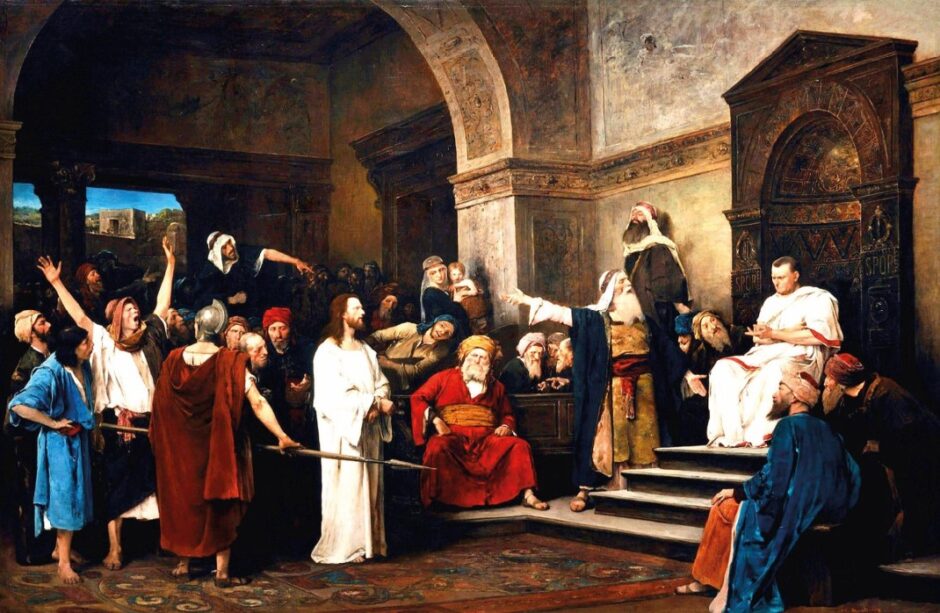IN THE BEGINNING was the Word, and the Word was with God, and the Word was God. He was in the beginning with God. All things were made through him, and without him was not any thing made that was made. In him was life, and the life was the light of men. The light shines in the darkness, and the darkness has not overcome it (John 1:1–5).
John’s Gospel opens with echoes of the creation of the world itself. The first chapter of Genesis tells us how all things were called into being by the commands of God. And so ‘By the word of the Lord the heavens were made, and by the breath of his mouth all their host’ (Psalm 33:6).
God’s Word was manifested powerfully throughout succeeding history, by means of His angels and prophets, and shone in the darkness of the world, calling people to come out and come to the light. Then, at length and in God’s good time, something wonderful happened:
The Word became flesh and dwelt among us, and we have seen his glory, glory as of the only Son from the Father, full of grace and truth (John 1:14).
This is how John introduces us to Jesus Christ. He is the wisdom of God personified. In Christ we see God Himself, as nowhere else. The flowers are wonderful but we cannot find God there. The sky has a mysterious beauty but we cannot find God there. I hear the thunder but that is not God in His perfection. But when I see the man from Nazareth, I know that God has come close to my consciousness. I do not say that God has come nearer to us in Jesus Christ – He is ever near us – I say He has come nearer to our consciousness.
Through the Word become flesh, God is made known in a unique way. Jesus Christ is the unveiling of God’s goodness and the awfulness of His truth. The unfolding of the divine holiness in human form. The Word became flesh, and dwelt among the Galilean fishermen, and they beheld the glory of God.
When He created humans God said, ‘Let us make man in our image, after our likeness’ (Genesis 1:26). You and I are but imperfect impressions of the likeness of God, but in Christ His perfection shines forth. In Christ we see what God intends us to be. He is the archetypal man. He was born as one of us. The Apostle John saw him, touched him, heard him speak, and declared that he had seen the glory as of the only Son from the Father, full of grace and truth. Full of the beauty of holiness.
Full of Grace
When we come to know Jesus, we know that God is vitally interested in our plight. We know that God is susceptible to the feeling of our pain and our bruises and our weakness. We know that God cares about our needs. The light of heaven breaks upon the darkness of earth.
Jesus felt all the agony of the widow of Nain, and raised her son back to life (Luke 7:11–17). He looked on the man who had lain for 38 withered years, and made him stand up (John 5:1–17). The woman with the discharge of blood—emaciated, lonely, ostracised—found freedom and fellowship because she found him (Matthew 9:20–22). Those whose hearts were burdened by sin found forgiveness and restoration. Blind eyes were opened, and deaf ears were unstopped. The perishing received the prospect of eternal life.
‘Grace’ means ‘undeserved favour’, and in Jesus Christ God’s abundant grace is fully made known.
Full of Truth
In John chapter 2 we see Jesus in the temple in Jerusalem (vs. 13–22). The religious rulers had turned the House of God into a marketplace. The poor were being fleeced and the rich were being swindled. The place of prayer had become a den of robbers. The heart of Jesus was aflame with indignation. He made a whip of cords and drove them out of the temple. With clean windswept courage he did his Father’s work—the crooks were routed and no man dared stand up to him.
When he spoke, people knew that it was urgent, imperative, categorical. ‘Unless you repent, you will all likewise perish’ (Luke 13:3). ‘Everyone who looks at a woman with lustful intent has already committed adultery with her in his heart’ (Matthew 5:28). His word scorches the hypocrites and gives no comfort to the self- righteous. By his words we are unmasked—veils are rent, double faces are exposed. Our essential characters are revealed. We search ourselves in the light of the teaching of the Son of God, and we see that we are in desperate need of forgiveness.
We need grace and we need truth, and it would not be right to deceive us about ourselves. Jesus lays the measurement of God upon us. He shows us that we are sinners, and he shows us that God loves us nonetheless.
We Have Seen His Glory
The time came for the Lord to set his face towards Jerusalem, for the final Passover on which he knew he must die. With his disciples Peter, James and John he ascended a mountain to pray (Luke 9:28–36). It was preparation for the ordeal which lay ahead. He was strengthened by the very presence of two of his predecessors, those Old Testament giants of faith Moses and Elijah.
‘And as he was praying, the appearance of his face was altered, and his clothing became dazzling white’ (v. 29). Do you think that this was the shining upon him of light from heaven, or was it not rather the glory of his perfection shining out from himself? It was as though for a moment the Kingdom of God had come. For a moment, the glory of God in Jesus broke through the limitations of flesh and was manifested in all its splendour. The record says that his disciples ‘saw his glory’ (v. 32).
Before the World Existed
As the time of his sacrifice approached, he spoke some enigmatic words to his Father in prayer: ‘And now, Father, glorify me in your own presence with the glory that I had with you before the world existed’ (John 17:5). Jesus did not exist before his birth, so what did he mean? He said that he had the divine glory before he was born. This should be no surprise. God knows the end from the beginning (Isaiah 46:9–10). The Apostle says to his faithful brothers and sisters that God ‘chose us in him before the foundation of the world, that we should be holy and blameless before him’ (Ephesians 1:4). From the beginning God chose His people, and He glorified His Son.
God said through the prophet, ‘Truly, as I live, and as all the earth shall be filled with the glory of the Lord’ (Numbers 14:21). Was not this the glory which Christ had with his Father before the world existed?
Lamenting the faithlessness of the people, John quotes the prophet Isaiah: ‘“He has blinded their eyes and hardened their heart, lest they see with their eyes, and understand with their heart, and turn, and I would heal them.” Isaiah said these things because he saw his glory and spoke of him’ (John 12:40–41).
John is quoting Isaiah chapter 6, and it is in this very chapter that the prophet describes the vision he had by which he was called to begin his prophetic work. ‘In the year that King Uzziah died I saw the Lord sitting upon a throne, high and lifted up; and the train of his robe filled the temple’ (v. 1). Isaiah was overawed: ‘And I said: “Woe is me! For I am lost; for I am a man of unclean lips, and I dwell in the midst of a people of unclean lips; for my eyes have seen the King, the Lord of hosts!” (v. 5). He saw a vision of a King reigning in righteousness. He returned to the theme later in his prophecy: ‘Your eyes will behold the king in his beauty; they will see a land that stretches afar’ (33:17). Was it the glory of God’s Son as yet unborn that was revealed to Isaiah, as he began his long prophetic ministry in which he saw so many things concerning the Messiah’s life, death and glory?
So then we retrace our steps to John 17. As Jesus was prepared for the road to Jerusalem by his glorification on the mountain, now the evening before the Passover had arrived he steeled himself for his ordeal. ‘Jesus, the founder and perfecter of our faith, who for the joy that was set before him endured the cross, despising the shame, and is seated at the right hand of the throne of God’ (Hebrews 12:2). He was praying to experience the assurance of the glory which was his from the beginning.
Was his prayer answered?
Manifesting God
In the Garden of Gethsemane, as he contemplated his forthcoming ordeal, the Lord was full of sorrow to the point of sweating blood (Luke 22:44)—yet a little while later, in the presence of the very things he had dreaded, he was strong, majestic, fearless. In the great drama of his various trials, he was the only one who was assured and composed! What had happened? I do not pretend to know—I feel my way and ask you to notice it.
In the prophet Isaiah’s great prophecy about the suffering of the Messiah, he says, ‘Out of the anguish of his soul he shall see and be satisfied’ (Isaiah 53:11). We read in the Gospels that during his trial in Gethsemane, an angel appeared and strengthened him (Luke 22:43). With what did the angel strengthen him? Did he receive a manifestation of the glory he had with his Father before the world was? It was that he had sought.
The sacrifice of the cross was the deed from which issued the fullest and noblest manifestation of God’s glory in Jesus Christ. These are the Apostle Paul’s majestic words:
Being found in human form, he humbled himself by becoming obedient to the point of death, even death on a cross. Therefore God has highly exalted him and bestowed on him the name that is above every name (Philippians 2:8–9).
In another place Paul gives us an interpretation of that manifestation: ‘In him the whole fullness of deity dwells bodily’ (Colossians 2:9). Let us be careful not to underestimate the meaning of these words. That word ‘deity’ is the Greek word ‘deitas’. It is a deep and profound word which the Greeks used to express the essence of God. It is the only time the word is used in the Bible. You can find divinity all through nature. Every blade of grass and every flower bears the hallmark of its divine Creator, and therefore has some mark of divinity in it. But you cannot say that the fullness of the Deity is to be found in any of these things.
Paul says that all the fullness of the Deity dwells in Christ. And when he uses the word ‘bodily’, he does not mean just wholly. That’s how we use it sometimes: we say for example that something went over the cliff bodily—we mean it went over in one whole. Paul does not mean that here. ‘Bodily’ here means ‘in a body’.
The word ‘fullness’ is significant. It is the word ‘pleroma’ and was a favourite word of the Gnostic heretics of the First Century— that is, the Gnostic philosophers who infiltrated the community of Christians and tried to reinterpret Bible truth according to their philosophical theories. They said that the fullness of God had its manifestation in hundreds of ways and the sum total of them conceived together was the ‘pleroma’. It seems that Gnostic philosophy was causing problems in Colosse, and Paul tackles it from various angles in this letter. Here he takes the Gnostics’ word ‘pleroma’ and uses it to proclaim that only in the glorified Jesus Christ is to be found the true fullness of the Deity.
Isaiah saw it, and said ‘Woe is me!’ (Isaiah 6:5). Paul saw it and was blinded (Acts 9:3–8). John saw it and fell as one dead (Revelation 1:17).
This is not an interpretation of Paul’s words—I have merely repeated his description of the glorified Son of God. ‘In him the whole fullness of deity dwells bodily.’ It is the fullest realisation of the glory which he had with God from the foundation of the world—and is now manifest in the man who sits at the right hand of God (Hebrews 1:13), shortly to be manifest to the world when he returns in glory (Mark 8:38).
Dennis Gillett







